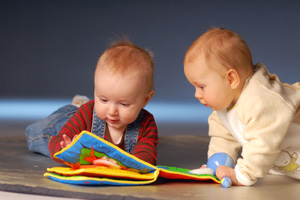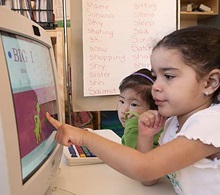 Infant Massage
Infant Massage
by Carolyn Oleson
Best stated, infant massage is a wellness program for children. When else would it be better to implement and instill wellness into people than in childhood? Optimizing our well-being is generally an ongoing goal for all, and infant massage is a great avenue for reaching toward that goal.
Infant massage, also called nurturing touch, is health promoting in a number of ways. One of the most significant results is the enhancement of immune function. Research findings show lower levels of stress hormones in children who are massaged. Knowing that stress hormones sabotage our immune systems and negatively impact health and learning makes using this anti-stress routine a powerful tool for parents.
Another compelling reason to practice nurturing touch for children is the building of neuronal connections. Brain researchers along with child development experts have identified touch as one of the “10 Things Every Child Needs” (McCormick Foundation Project) to grow the brain and enable children to more fully reach their potential.
Massage also can bring about many positive effects that will help parents get through the day in a more loving way. Such effects include helping the child to sleep deeper and longer, and providing relief from gas, colic,
constipation, teething pain, and congestion. Massage is also known to improve muscle tone, digestive tone, and circulation, and to deepen respiration. Best of all, it strengthens the relationship and enhances bonding and communication between parent or teacher and child.
Unlike other massage approaches, infant massage is unique in that it is meant to be provided by a parent or other primary caretaker. The International Association of Infant Massage trains providers to instruct parents on how to massage their child with emphasis on individualizing for each child. The trick is to get the parent to let go of expectations and allow for joyful interaction. It is when parents let go and give unconditional love to their child through touch that remarkable effects are brought about.
Children with special needs ranging from developmental delays to complex medical problems can benefit dramatically from touch. It is possible that this dramatic effect is related to the empowerment that parents feel from providing nurturing touch to their children. When struggling with physical or medical problems, this empowerment goes a long way.
Small group classes of up to four sessions are taught to parents of well babies through various health outreach programs such as hospitals, spas, or health clubs. Instruction is also done for children with special needs on a private basis because of the need to individualize for that child. Instructors certified by the International Association of Infant Massage (IAIM) are available in most areas of the United States.
Infant massage is fairly new to this country, starting in the Midwest in the mid ’80s. It has been part of other cultures in different countries for centuries. Americans are catching on. The IAIM’s goal for the future is to have infant massage passed down from generation to generation. Then it will be an important element of child rearing in American culture too.
For more information on infant massage, contact the International Association of Infant Massage at (805) 644-8524.

 Patience, and the mulberry leaf becomes a silk gown. -Chinese Proverb
Patience, and the mulberry leaf becomes a silk gown. -Chinese Proverb